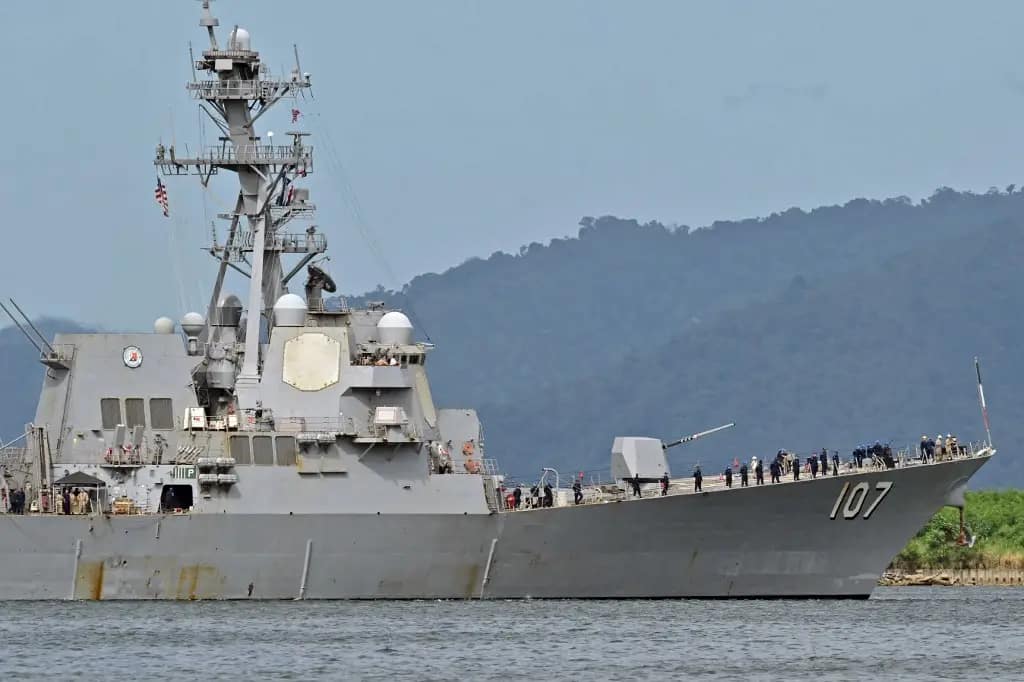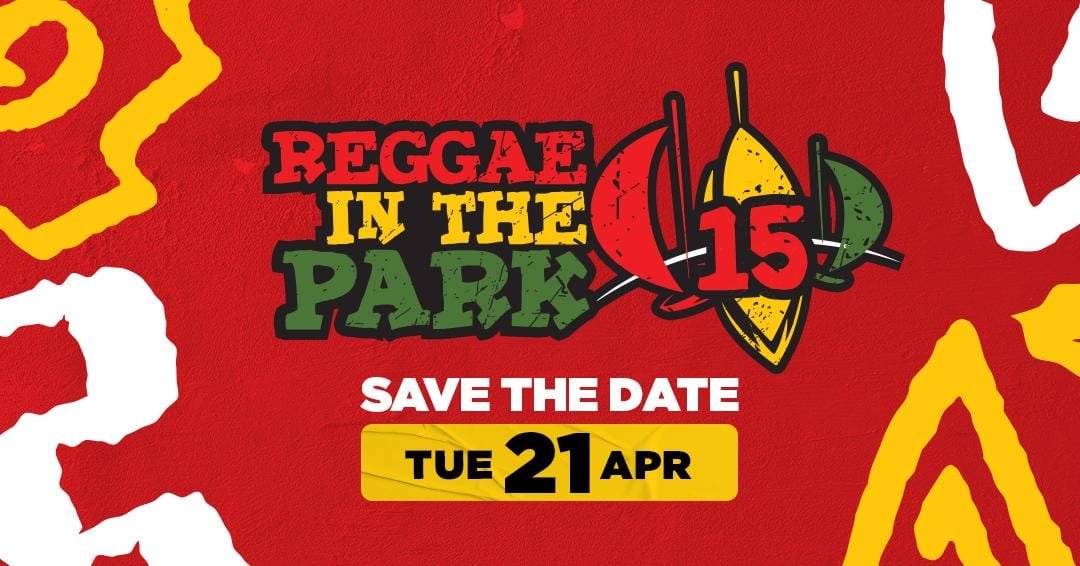
(CMC) — The United States warship, USS Gravely, arrived in Trinidad and Tobago on Sunday even as Prime Minister Kamla Persad-Bissessar sought to down play threats of military aggression in the region.
In addition, Barbados Prime Minister Mia Mottley, addressing the 86th annual conference of her ruling Barbados Labour Party (BLP) on Saturday night, expressed concern at the “menacing military” US vessels across the Caribbean Sea, urging dialogue to prevent war from starting.
Mottley said if ever there is a need to remind how unstable and dangerous the world is “and how vulnerable our Caribbean region is, it is now with us facing a multiplicity of threats” including the passage of Hurricane Melissa that is likely to strike Jamaica and Haiti in the coming days.
“We don’t have to look any further than the menacing military vessels from the United States across the Caribbean Sea, including what is reputed to be the world’s largest warship. These are not times of pirates anymore, this is 2025 and we have cause to be duly concerned,” she said.

Last week, the Donald Trump administration announced that it is intensifying its military build-up in the Caribbean with Defence Secretary Pete Hegseth ordering the deployment of the world’s largest aircraft carrier, the USS Gerald R Ford, and its carrier air wing, to the Caribbean in aid of what the administration says is its counter-drug initiative.
Washington said the enhanced US force presence in the US Southern Command Area will bolster US capacity to detect, monitor and disrupt illicit actors and activities that compromise the safety and prosperity of the United States homeland and its security in the Western Hemisphere.
In recent times, the Trump administration has deployed several warships and over 10,000 troops to the Caribbean in what pundits claim is a pretext for an eventual land invasion of Venezuela.
At least two Trinidad and Tobago nationals are among several people killed as the US military bombs vessels it claim are transporting illegal drugs on the international seas. It has provided no proof to substantiate the allegations and Prime Minister Persad-Bissessar has said that the US should kill all those engaged in the illegal d rugs trade “violently”.

Earlier this month, Trump confirmed that he had permitted the Central Intelligence Agency (CIA) to spy on Venezuela.
The Trinidad and Tobago Ministry of Foreign and Caribbean Community (Caricom) Affairs said in a statement that the USS Gravely, an Arleigh Burke-class destroyer, will be docked in Port-of-Spain, until October 30. It said that the 22nd US Marine Expeditionary Unit and the Trinidad and Tobago Defence Force (TTDF) will conduct joint training exercises.
“The visit strengthens US-Trinidad and Tobago military-to-military cooperation through expert exchanges focused on core infantry tactics, maintenance procedures and advanced medical capabilities, leveraging the TTDF’s facilities to enhance tactical proficiency and enhance mutual trust,” the statement said.
Speaking to reporters as she emerged from the Parliament building late Saturday, Prime Minister Persad-Bissessar, a strong supporter of the US initiative, dismissed a statement that had been issued late last week by former Caricom leaders who have reiterated the need for the Caribbean to remain a “zone of peace”.
Former Prime Minister’s PJ Patterson and Bruce Golding, said that they are impelled to urge a pull back from military build up to avoid “any diminution of peace, stability and development within our regional space that has the potential to pull the region into conflicts which are not of our making”.
But Persad-Bissessar again sought to indicate that she was first and foremost putting the safety of her citizens at the forefront of the war on drugs.
“We have had over 600 murders last year and almost every year counting. They have not had that experience. So, I think they have a different reality. In Trinidad and Tobago, the reality is we are crime-ridden, we are drug-ridden.
“They are entitled to their view on the whole issue of a zone of peace, but in Trinidad and Tobago there is clearly no zone of peace. There is none. Therefore, as I say, Trinidad and Tobago first; we have to take care of our people first. I do not have the same view as they do because I think we are the worst impacted by this issue.”
She said historically and geographically, her country is the closest to where the drugs are coming from, the narcotrafficking, the human trafficking and the gun running.
Regarding the presence of the USS Gravely, the Trinidad and Tobago prime minister said “safety is priority number one to help keep the narcotraffickers, drug traffickers and human traffickers out”, adding that her country will benefit from “information technology assistance and some humanitarian work in using their marines and their navy members to help us with schools or maybe some of our bases to upgrade”.
“Our infrastructure has been so run down, so they have offered that as well. In addition to the safety, security and the training, they are also going to give us some training here in Trinidad and Tobago.”
But the Barbados Prime Minister said that the region is now facing “an extremely dangerous and an untenable situation in the southern Caribbean and as a people with a tragic history of being subjected to centuries of big power orchestrated genocide, terrorism and warfare and as a small state, we have invested tremendous time and energy…in establishing and maintaining our region as a zone of peace”.
“Peace is critical to all that we do in this region and now that peace is being threatened we have to speak up,” she said, thanking the former prime ministers Golding and Patterson for their “very strong statement issued by them for the fundamental principle that was agreed upon the formation of the Caribbean Community”.
“I want to thank them because without their statement we are possibly going to have others think that those who now lead Governments are speaking in vain without reflecting on the fact that this has been a core principle of the Caribbean Community from its very inception.
“Thank you, thank you, thank you, prime ministers,” Mottley said, adding that she believes the time has come for the region not to accept any entity “has the right to engage in extrajudicial killings of persons they suspect of being involved in criminal activities”.
Mottley, who is also an attorney, said “as I said we stand for the rule of law, and we believe if there is other intelligence available that would cause you to take action that is an immediate threat to you as a nation then you have a duty to share it with us”.
“But on the face of it, conflating law enforcement with military action is a dangerous step,” Mottley said, adding “we equally do not accept that any nation in our region or the greater Caribbean should be the subject of an imposition upon them of any unilateral expression of force and violence by any third party or nation”.
“If there are conflicts and disputes that are in need of resolution, then the place they need to be taken for such resolution is the United Nations organisation and the methodology that should be deployed for the resolution is one of negotiation and peaceful actions taken in order to ensure that we can settle disputes,” she said.
Advertise with the mоѕt vіѕіtеd nеwѕ ѕіtе іn Antigua!
We offer fully customizable and flexible digital marketing packages.
Contact us at [email protected]















Kamla is a kunt
I am in support of the US on this. Go after the drug makers, and shippers. Continue to patrol international waters and take lawful and moral actions to stop these criminals.
A lot of people running their mouth and don’t even realize that Mudoro lost the presidency and refused to leave office.
Ask his very own people who he is, and they will tell you.thiscman is no saint
All these war vessels, even aircraft carrier to fight a few speed boats they claimed trying to make this distant journey from Venezuela to some where in the US. Keep in mind not once did we hear any of these power boats fired or attempted exchanged any fireworks with the US vessels, yet just like that they are being wipe off the face of our waters without any proof or evidence to show. We were told they had two survivors, but instead of taking them to the US to be questioned and stand trial, they instead send them back to Columbia. I also understood dead bodies are now floating up on shores of certain Caribbean islands.
This is an administration that often speaks of too many people being killed in these wars, but to them it doesn’t even have to be a war to do likewise.
The blogger above claimed Maduro lost the presidency and refuse to leave office, but I wonder if the man holding all this power in his hands presently would’ve stepped down or continued his reign in office like the man he wants to overthrow.
@ my way of helping
What the Americans are doing is neither legal nor moral you are as wrong as the they are. I am against people who are drug dealers but there is alwats a right and wrong way to do things. America thinks might is right because nobody in this hemisphere can match their strength
It’s about OIL, and the fact that China is assisting Venezuela with the self-elevating off-shore oil rig in Lake Maracaibo. This rig is expected to boost Venezuela output from 12,000 to 60,000 barrels per day by next year 2026.
Trinidad and Guyana is banking on USA to assist them in keeping Venezuela at bay. The other Caribbean islands like Antigua & Barbuda, that depend on Venezuela for their help is once again caught in the middle of the SUPER POWERS GREED.
Drugs/dope is the scapegoat for the American aggression. The real DOPE is the oil which HUEman Civilizations of today are addicted to for their vain living mostly.
Jumbee_Picknee aka Ras Smood
De’ole Dutty Peg🦶🏿Garrat_Bastard
Vere Edwards
@Ras.. I get your point..so what goes around comes around.
Why is Venezuela applying so much pressure to little GT for this same oil?
GT are a people too, and they themselves have suffered at the hands of their neighbor Venezuela.
To talk about the US and not what this Mudoro guy stands for, is a little narrow minded. I don’t think America gives a shit about oil in Venezuela. This man Mudoro was voted out by his own people, and the dictator is still holding on to power. But don’t worry, they will soon snipe him.
Do you know that 1/5 of the population of Venezuela has migrated in the pass 10 years?
This very same Venezuela was once the richest country in South America. Does that have anything to do with oil, or Venezuela own corrupt politicians like Mudoro.
The lesser is two evils brother..that’s how you have to look at life, because invariably we are all sinners, but not all wicked.
@Ras.. I get your point..so what goes around comes around.
Why is Venezuela applying so much pressure to little GT for this same oil?
GT are a people too, and they themselves have suffered at the hands of their neighbor Venezuela.
To talk about the US and not what this Mudoro guy stands for, is a little narrow minded. I don’t think America gives a shit about oil in Venezuela. This man Mudoro was voted out by his own people, and the dictator is still holding on to power. But don’t worry, they will soon snipe him.
Do you know that 1/5 of the population of Venezuela has migrated in the pass 10 years?
This very same Venezuela was once the richest country in South America. Does that have anything to do with oil, or Venezuela own corrupt politicians like Mudoro.
The lesser of two evils brother..that’s how you have to look at life, because invariably we are all sinners, but not all wicked.
Comments are closed.